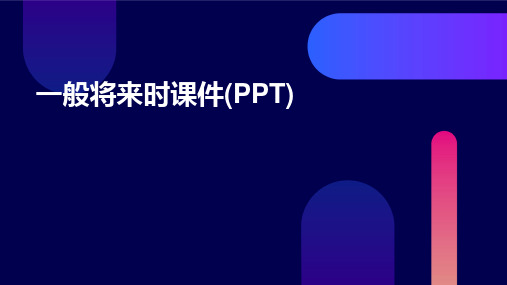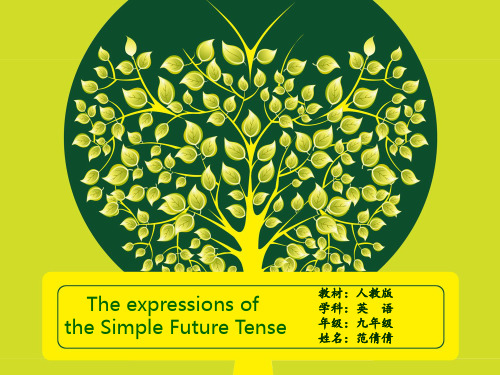一般将来时公开课课件PPT.
合集下载
初中一般将来时公开课课件ppt

否定回答:No, 主语+won’t.
单击此处添加大标题内容
doctor, actor, lawyer or a singer 医生,演员,律师,还是歌手?
why not president, be a dreamer 为什么不能是当总统呢,要成为一个梦想家
you can be just the one you wanna be 只要你想,你就能成为你想做的人
否定句:Bus will not run everywhere. 疑问句:Will bus run everywhere? People will have robot . 否定句:people won’t have robot. 疑问句: Will people have robot? People will have less teeth. 否定句: People won’t replace people 疑问句: Will robot replace people?
• will be; is
B. is; is
• C. will be ; will be D. is ; will be
3. Mother me a nice present on my next
birthday.
A. will gives B. will give C. gives D. give
Conclusion 总结
构成:1.肯定句:主语+will +动词原形+其他
时间标志词:
tomorrow
soon
from now on
In the future
next+
in +
2否定句:主语+won’t+动词原形+其他
单击此处添加大标题内容
doctor, actor, lawyer or a singer 医生,演员,律师,还是歌手?
why not president, be a dreamer 为什么不能是当总统呢,要成为一个梦想家
you can be just the one you wanna be 只要你想,你就能成为你想做的人
否定句:Bus will not run everywhere. 疑问句:Will bus run everywhere? People will have robot . 否定句:people won’t have robot. 疑问句: Will people have robot? People will have less teeth. 否定句: People won’t replace people 疑问句: Will robot replace people?
• will be; is
B. is; is
• C. will be ; will be D. is ; will be
3. Mother me a nice present on my next
birthday.
A. will gives B. will give C. gives D. give
Conclusion 总结
构成:1.肯定句:主语+will +动词原形+其他
时间标志词:
tomorrow
soon
from now on
In the future
next+
in +
2否定句:主语+won’t+动词原形+其他
一般将来时课件(PPT)

“be able to”表示将来有能力做某 事时,使用一般将来时形式,例如“I will be able to help you”。
情态动词如“can”、“may”、 “must”等,在一般将来时中通常直 接加动词原形,例如“I can swim”。
03
一般将来时在句子中的运用
陈述句中的使用
表示将要发生的动作或存在的状态
纠正方法
应使用正确的将来时形式,如 "He will go to the park tomorrow." 或 "He is going to the park tomorrow."
忽略动词变化规则
错误示例
They will play football in the future.(忽略了动词play在将来时中的变化)
纠正方法
在将来时中,应使用正确的助动词或情态动词形式,如 "I will be able to help you with your homework." 或 "I can help you with your homework."
错误示例
He will must finish his work before leaving.(错误地使 用了情态动词must)
作用
用于表示未来的计划、打算、预测、 假设等。
常见表达形式
will + 动词原形
表示将来的动作或状态,如“I will go to the park tomorrow.”(我明天将去公园。)
be going to + 动词原形
表示计划、打算或即将发生的动作,如“I am going to study hard this semester.”(我这 学期打算努力学习。)
一般将来时PPT课件(PPT18张)

(肯)——Yes, there is/are. (否)——No, there is/are not.
e.g.
① Th翻er译e :is g下oi周ng这to里b将e 会a s有po一rt个s m运e动et会ing。next week.( (肯定式)
② There isn’t going to be a sports meeting next week (否定式) ③ ——Is there going to be a sports meeting next week?(一般疑问式)
be going to be + done (表示按计划或安排发生的被动动作)
be about to
(指将要发生的事情)
be.tgo. be + done (表示按计划或安排发生的被动动作)
1. The bridge will be finished
next month. (finish)
2. The problem is going to be discussed at the meeting.(be going to,discuss) 3. The sports meet is to be held on Oct. 运动会将于10月5日举行
4. do sth表将来 一般现在时表将来,主要用于时间状语从句和条件状语从句中,或者用来表示 按照时刻表的规定将要发生的事情。如: I’ll tell him about it as soon as I see him.我一见到他就告诉他这事儿。 My plane takes off at seven tomorrow morning. 我的飞机明天早上7点起飞。
A. are having B. are going to have C. will having D. is going to have
e.g.
① Th翻er译e :is g下oi周ng这to里b将e 会a s有po一rt个s m运e动et会ing。next week.( (肯定式)
② There isn’t going to be a sports meeting next week (否定式) ③ ——Is there going to be a sports meeting next week?(一般疑问式)
be going to be + done (表示按计划或安排发生的被动动作)
be about to
(指将要发生的事情)
be.tgo. be + done (表示按计划或安排发生的被动动作)
1. The bridge will be finished
next month. (finish)
2. The problem is going to be discussed at the meeting.(be going to,discuss) 3. The sports meet is to be held on Oct. 运动会将于10月5日举行
4. do sth表将来 一般现在时表将来,主要用于时间状语从句和条件状语从句中,或者用来表示 按照时刻表的规定将要发生的事情。如: I’ll tell him about it as soon as I see him.我一见到他就告诉他这事儿。 My plane takes off at seven tomorrow morning. 我的飞机明天早上7点起飞。
A. are having B. are going to have C. will having D. is going to have
一般将来时课件ppt(共17张PPT)

Jim going to
afternoon?
in the playground tomorrow
4. .Jim is going to play football in the playground tomorrow afternoon.
Jim going to play football tomorrow afternoon?
2)在浊辅音和元音后读/d/.
一般过去时, 要用动词过去式. Jim is going to play football in the playground tomorrow afternoon.
Jim is going to play football in the playground tomorrow afternoon. ⑵are变为were。
there were many beautiful flowers there. 一般将来时表示将来某个时间要发生的动作或存在的状态常与表示将来的时间状语连用
⑴am ,is变为was。
So she They to read some books.
What did they do in the park? 1)在清辅音后读/t/ .
(3).动词过去式变化规则
a)一般情况下,直接加ed.如:wash--washed, look---looked; b)以不发音字母e结尾的,加d.如:like---
liked, dance---danced; c)以“辅音字母+y”结尾的,变y为i再加ed. 如:study---studied;
food and (play) lots of games. They
(come) home at 4:30.
一般将来时ppt课件

02 一般将来时的基本用法
表示将来要发生的行为
要点一
常见的助动词“will”和 “shall”可以用于表示将…
“I will go to the store tomorrow.”(我明天要去商店。 )
要点二
“be going to”也可以用于表达 将来要发生的行…
“It is going to rain later.”(待会儿要下雨了。)
肯定句
I am going to swim in the afternoon.
否定句
They are not going to watch the movie.
疑问句
Are you going to meet your friend tomorrow?
主语+be to+动词原形
肯定句
You are to hand in your homework tomorrow.
表示邀请或建议
总结词
表示邀请或建议某人做某事,通常用于 口语交流中。
VS
详细描述
在口语交流中,我们经常使用一般将来时 态来表示邀请或建议,例如:“Would you like to come to my house for dinner tomorrow?”(明天你想来我家 吃晚饭吗?)或者“Let's go for a walk after dinner.”(晚饭后我们去散步吧。 )
02
在一些情况下,我们也可以使用“be going to”来表达将来时
。例如
It is going to rain.(将要下雨了。)
03
构成
They are going to graduate next year.(他们将于明年毕业。)
一般将来时课件(PPT)

No, she is not/isn't.
(2).变特殊疑问句
①
②
③
They will __ha_v_e_a_n_E_n_g_li_sh__pa_r_ty___next week.
① Who will have an English party next week ? ② What will they do next week ? ③ When will they have an English party?
No,they won’t(=they’ll not).
注意:won’t=will not
They won’t have an English party next week.
变疑问句将will,shall提至句首 否定式:在will/shall后加not
回答: (肯)Yes,主语+will. (否)No,主语+won’t.
C、visits
难度加深题
填空:
1、 A:I need some paper.
B:I _________(bring) some fobe) free tomorrow?
3、______we _____ (go) to the party together this afternoon?
( ) 4. Mary ________ here next month. A. isn't working B. doesn't working C..won't work
( )5.Next week Quincy
his pen pal in
London.
A、is going to visit B、visit
(2).变特殊疑问句
①
②
③
They will __ha_v_e_a_n_E_n_g_li_sh__pa_r_ty___next week.
① Who will have an English party next week ? ② What will they do next week ? ③ When will they have an English party?
No,they won’t(=they’ll not).
注意:won’t=will not
They won’t have an English party next week.
变疑问句将will,shall提至句首 否定式:在will/shall后加not
回答: (肯)Yes,主语+will. (否)No,主语+won’t.
C、visits
难度加深题
填空:
1、 A:I need some paper.
B:I _________(bring) some fobe) free tomorrow?
3、______we _____ (go) to the party together this afternoon?
( ) 4. Mary ________ here next month. A. isn't working B. doesn't working C..won't work
( )5.Next week Quincy
his pen pal in
London.
A、is going to visit B、visit
《一般将来时》课件
be going to+动词原形
结构
主语+be going to+动词原形+其他 成分
例子
We are going to meet at the train station at 5:00.(我们计划在5点钟 在火车站见面。)
含义
表示计划或安排将来要发生的动作或 状态
用现在进行时表示
结构
主语+be+动词现在分词+ 其他成分
一般将来时可以用来表示对未来事件的预见或推测,通常与时间状语连用,如“in the future”、 “next year”等。例如,“It will rain tomorrow.”(明天会下雨。)
表示意图、打算或希望
总结词
表示个人的意图、打算或意图、打算或希望,通常与 表示意图的动词连用,如“plan”、“intend”、“hope” 等。例如,“I will visit my grandparents next week.”( 我打算下周去看望我的祖父母。)
含义
表示将来某个时间正在进 行的动作或状态
例子
He is coming here next week.(他下周将会来这 里。)
用一般现在时表示
结构
主语+动词原形+其他成分
含义
表示将来某个时间经常发生的动作或状态
例子
I do my homework every day.(我每天都会做作业。)
03
一般将来时的肯定句、否定句和 疑问句
感谢观看
基本构成
will + 动词原形
疑问句形式
Will + 主语 + 动词原形
否定句形式
一般将来时课件PPT.上课用
注意事项
与“be going to + 动词原形”和“will + 动词原形”相比,“be about to + 动词原形”更强调即将发生的紧迫性。
04
一般将来时的否定形式
will not = won’t
01
"will not" 是 "will" 的否定形式 ,表示将来某个时间不会发生某 件事情。
明年这个时候我们将在巴黎度假。
表示未来的时间状语从句的连用
一旦你完成这个项目, 你就可以休息了。
即使明天下雨,我们 也会按时举行运动会。
只要他一回来,我们 就出发。
表示未来的时间状语从句的省略
明天见。 下周再见。
明天这个时候我们会在飞机上。
THANKS
主语 + will not + 动词原形 + 其他成分,例如:He will not come back until next month.(他下个月之前不会回来。)
Will + 主语 + 动词原形 + 其他成分,例如:Will you be available this afternoon?(你今天下午有空吗?)
表示预测和推测
总结词
一般将来时也可以用来表示对未来的预测和推测,通常基于 某种事实或证据。
详细描述
当我们根据已知事实或证据推断某件事情将在未来发生时, 可以使用一般将来时。例如,“根据天气预报,明天会下雨 ”表示对天气的预测,“根据市场趋势,明年房价可能会上 涨”表示对未来的推测。
表示意愿和打算
05
一般将来时的疑问形式
will + 主语 + 动词原形?
总结词
与“be going to + 动词原形”和“will + 动词原形”相比,“be about to + 动词原形”更强调即将发生的紧迫性。
04
一般将来时的否定形式
will not = won’t
01
"will not" 是 "will" 的否定形式 ,表示将来某个时间不会发生某 件事情。
明年这个时候我们将在巴黎度假。
表示未来的时间状语从句的连用
一旦你完成这个项目, 你就可以休息了。
即使明天下雨,我们 也会按时举行运动会。
只要他一回来,我们 就出发。
表示未来的时间状语从句的省略
明天见。 下周再见。
明天这个时候我们会在飞机上。
THANKS
主语 + will not + 动词原形 + 其他成分,例如:He will not come back until next month.(他下个月之前不会回来。)
Will + 主语 + 动词原形 + 其他成分,例如:Will you be available this afternoon?(你今天下午有空吗?)
表示预测和推测
总结词
一般将来时也可以用来表示对未来的预测和推测,通常基于 某种事实或证据。
详细描述
当我们根据已知事实或证据推断某件事情将在未来发生时, 可以使用一般将来时。例如,“根据天气预报,明天会下雨 ”表示对天气的预测,“根据市场趋势,明年房价可能会上 涨”表示对未来的推测。
表示意愿和打算
05
一般将来时的疑问形式
will + 主语 + 动词原形?
总结词
小学英语语法课件- 一般将来时 (共36张PPT) 全国通用
Presentation Sentences
She will take swimming lessons in this vacation. 她今年假期要去学游泳。 She is going to go shopping tomorrow. 她明天要去购物。 Jim will open a shop on internet. 吉姆打算要在网络上开个店。 Jim is going to be an actor when he grows up. Jim长大了想当一名演员。
___t_o_m_o_r_ro_w_.____________________________ 一般疑问句:A__re_t_h_e_c_h_il_d_re_n_g_o_i_ng__to__w_a_tc_h_a_d_o_l_p_h_in_s_h_o_w__
t_o_m_o_r_ro_w_?____________________________ There will be a great concert next week. 否定句:_T_h_e_r_e_w_il_l _n_o_t b_e__a_g_re_a_t_c_o_n_ce_r_t _n_ex_t_w_e_e_k_. ______ 一般疑问句:_W_i_ll_th_e_r_e_b_e_a_g_r_e_a_t _co_n_c_e_rt_n_e_x_t_w_e_e_k?______
Practice Oral Practice
小组合作完成单项选择,并朗读句子
( C ) There __________ a meeting tomorrow afternoon.
A. will be going to
B. will going to be
C. is going to be
一般将来时课件
表示预测和推测
总结词
表示预测和推测时,一般将来时用于描述对未来事件或情况 的预测或推测。
详细描述
在英语中,一般将来时也可以用于表示预测或推测,通常与 表示推测的副词连用,如"probably"、"possibly"、"likely" 等。例如,"It will probably rain tomorrow"表示明天可能 会下雨。
理解一般将来时在各 种语境中的应用。
学习方法
通过实例和练习,深入理解一 般将来时的语法规则和用法。
通过模仿和练习,提高口语和 书面表达能力。
结合实际语境,运用一般将来 时进行交流和表达。
01
一般将来时的定义 和结构
定义
定义
一般将来时是表示将来某个时间 将要发生的动作或存在的状态, 常常与表示将来的时间状语连用 ,如“明天”、“下周”等。
与条件状语从句连用
总结词
表示在满足一定条件下,未来将发生的 动作或状态。
VS
详细描述
在英语中,当句子与条件状语从句连用时 ,一般将来时可以用来表示在满足一定条 件下,未来将发生的动作或状态。常见的 条件状语从句包括"if"、"unless"、 "when"等。例如,"If it rains tomorrow, we will stay at home."表示 如果明天下雨,将会待在家里。
01
一般将来时的否定 形式
否定句型
ቤተ መጻሕፍቲ ባይዱ主语 + will not + 动词原形
表示主语将不会进行某个动作。例如,“He will not come tomorrow.”(他明天不会来。)
- 1、下载文档前请自行甄别文档内容的完整性,平台不提供额外的编辑、内容补充、找答案等附加服务。
- 2、"仅部分预览"的文档,不可在线预览部分如存在完整性等问题,可反馈申请退款(可完整预览的文档不适用该条件!)。
- 3、如文档侵犯您的权益,请联系客服反馈,我们会尽快为您处理(人工客服工作时间:9:00-18:30)。
注意:will与be going to的区别,be going to可以表示明显将要发生的情况. B 3.There__ a basketball match this afternoon.
A.will have B.will be
C.has
D.have
A 4. We__ to the park if it is fine tomorrow.
There will be only one country. There is going to be an English test next Monday.
[注意]:无论后面加单数名词或复数形式,be都必须用原 形。
否定句:在will后面加not. 在is或are后加not。
There won’t be only one country.
There is not going to be an English test next Monday.
一般疑问句:把will提到there之前。把is或
are提到句首。Will there be only one country? Yes, there will. / No, there won’t.
What is she going to do? She’s going to shop/ go shopping.
will
What are they going to do ?
They are going to dance.
will
英汉互译。 1.我打算下个月将去长城玩参观。 I am going to visit the Great Wall next month. 2.他计划下周去钓鱼。 He is going to go fishing next week. 3.她决定明天去购物。 She’s going to go shopping tomorrow. 4.She is going to visit Beijing with her mother next year. 她计划明年和她的妈妈去北京参观。 5.They are going to dance in two days. 两天后他们将去跳舞。 6.我们下星期一将去买些水果。 We are going to buy some fruit next Monday. 7.路西和汤姆今天下午打算去游泳。 Lucy and Tom are going to swim this afternoon. 注意:be随主语的人称和数的变化而变化。
A.will go
B.go
C的适当形式填空。
going to (go) play soccer this afternoon. 1.The boys are __________ —————
going to play 2. _____ basketball with me Are you _____________(play) next week? ———— 3.The actor ___ is going to ________(move) move to New York. ——— 4. He admires actors very much. He’s going to take _____ (act) lessons every day. acting 5. Lucy ________________(not stay) at home —— next is not going to stay weekend. ———
C 1.Ihope that you__ a good time this evening. A.have B.are having C.will have D.has D rain.Let`s hurry. 2.Look at those big black clouds. It __ A.must B.will C.would D.is going to
What will the cat do ?
is going to
It will drink/eat.
is going to
What will they do this evening? They will watch TV. are going to
造句:(任何主语都用will+动词原形) 1.我下星期一将去学校。 I will go to school next Monday 2.她下周将帮我妹妹做家务。 she will help my sister do housework next week。 3.他们明天将去游泳。 They will swim with my sister tomorrow. 4.星期天我们将在星期一做作业。 We will do my homework on Sunday. 5.他明年将买一台电视机。 He will buy a TV next year.
A: When shall we have the party? B: We shall have the party next week?
看看shall(将要)与will的区 别: shall常用于第一人称. shall 否定式:shall not = shan’t 缩略形式 ’ will
will常用于第二、三人称,但在 口语中各种人称都可以用will.
问:There
is going to be a basketball match next week.中为什么不用have?have也是动词原 形啊? 答:因为这是there be的句型,不能用动词have, 要用be。
请大家一起来归纳总结并补充完整。
1、一般将来时态的构成: 主语+will ___+动原+表示将来 ____的时间状语。 Will 2、一般将来时态的一般疑问句:______+ 动词原形 表示将来的时间状语? 主语+__________+
一般将来时两种基本结构, 一:be going to引导 的一般将来时:表示将要发生的动作或安排,或打算、 计划、决定要做某事。结构为, be going to + 动词原 形 ,与表示将来的时间状语连用,tomorrow (明 天)the day after tomorrow (后天)before long (不 久)next week (下周)next Sunday(下个星期天)in three days (三天后),in 100 years(在100年后) in the future (将来), someday (将来的某一天)soon (很快)等。主谓(宾)句型”的一般将来时: 肯定句:主语+ is(am/are) +动词原形+(宾语)+其他 She is going to play basketball next Sunday. 否定句:在be 的后面加not即可。 She is not going to play basketball next Sunday. 一般疑问句:把be提到句子主语之前,结尾变问号。 Is she going to play basketball next Sunday? 特殊疑问句:特殊疑问词+be +主语+动词原形+其他? What is She going to play basketball next Sunday.
否定式:will not = won’t
ll
一般将来时两种基本句式的区别:
在初中阶段来讲,“be going to+动词原形”和 “will+动词原形”这两种表示将来时态的结构没什 么区别。但在现代英语中,特别是在口语中,表示 将来时多用“be going to+动词原形”这一形式。另 外他们主要区别在于“be going to+动词原形”表示 一个事先考虑好的意图,相当于“打算、计划、准 备”,而will则表示未经事先考虑的意图。是临时决 定的。 If you want to go, I’ll meet you at 5 o’clock. (临时 的决定) I’m going to be 16 years old next year. Look at the clouds! It’ s going to rain! (表示有迹象要发生某一动作时,要用be going to)
The Simple Future Tense
一般将来时
Unit 6 and Unit7
一般将来时的基本构成:be
going to+动词原形, will+动词原 形
next week
What is he going to do next week? He is going to go fishing. will
will he(they/she) do?) next month, tomorrow , next week , in three
days (三天后),
“There be”句型的一般将来时:表示将来某地会有某人 或某物
肯定句: There will be +名词+其他成份
There is/are going to be +名词+其他成份
“主谓(宾)句型”的一般将来时:(任何主语都用will+动词原形)
肯定句:主语+ will +动词原形+(宾语)+其他。 Some day people will go to the moon .
否定句:在will 的后面加not即可。will not 可缩写为 won’t。 They won’t use books .
/
句型转换。 1.They have a basketball match every Sunday. (用next Sunday 替换 every Sunday ) going ___ to ____ have a basketball match They____ ____ next Sunday. 2.We are going to have a school trip next week. (就划线部分提问) What ____ do are you ____ going ____ to ____next _____ week? 3.I’m going to see my teacher on Teachers’ Day. (改为一般疑问句,并做肯定回答) you going to see _____ your teacher on Are ____ --____ Teachers’ Day? / --Yes, I am.
